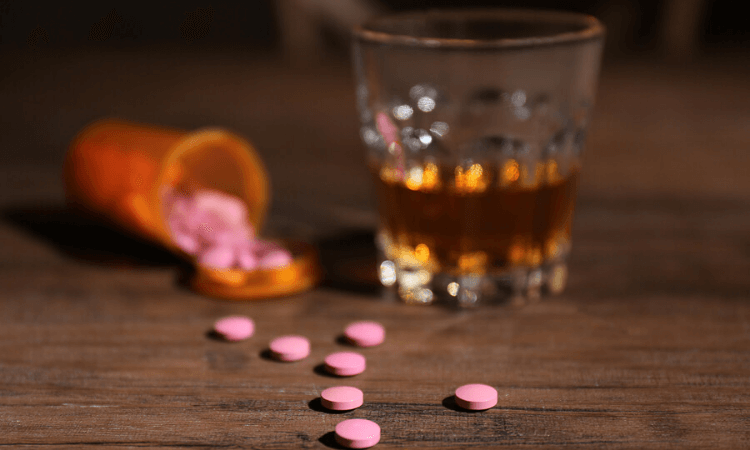
Risks of Using Suboxone and Alcohol – Suboxone is a medication most commonly used for the treatment of opioid use disorders, especially those that involve heroin. Warning labels on opiate drugs such as Suboxone strongly advise patients who use these drugs not to do so in conjunction with alcohol. Even so, many in recovery from opioids do consume alcohol at the expense of their health and recovery potential.
What Is Suboxone?
Suboxone contains the active ingredients: buprenorphine and naloxone. Buprenorphine is a partial opioid agonist, meaning that it attaches to the same receptors in the brain as other opioids, but it does not induce the full effects of these drugs. People who have opioid use disorders will not receive the same “high” from buprenorphine that they are used to feeling on their drug of choice.
Those who use buprenorphine will also not experience the severe withdrawal effects associated with opioid use cessation. The Drug Enforcement Administration (DEA) classifies buprenorphine as a Schedule III controlled substance, meaning that it has medical value but also has some potential for abuse and dependence.
Naloxone is an opioid antagonist, meaning that it also attaches to opioid receptors in the brain, but does not activate them. This drug also does not allow any other drugs to bind to these receptors, and, in fact, remove any that are already there. Once this effect of the drug is progress, people will immediately go through opioid withdrawal syndrome.
Naloxone is included in Suboxone as an extra safeguard intended to keep people from abusing Suboxone, and only becomes active if the drug is crushed and abused in some way. Naloxone is also commonly used as a standalone medication to reverse life-threatening effects, such as profound respiratory depression, in those individuals who have overdosed on opioids.
Suboxone is designed to be an opioid replacement drug to help those who have opioid use disorders endure the withdrawal process with minimal discomfort. Because Suboxone contains an opioid, it can also be used to control pain. Buprenorphine controls opioid withdrawal symptoms and can be effective in relieving mild to moderate pain.
Buprenorphine does induce some mild euphoric effects but also has a ceiling effect in place. This means that any attempt to use other opioids while taking buprenorphine or taking excessive amounts of buprenorphine to increase feelings of euphoria will not result in a significant high. Because Suboxone is a long-acting medication, it only needs to be taken once per day in most cases.
Suboxone Abuse

Despite these safeguards, buprenorphine can be misused. According to the Substance Abuse and Mental Health Services Administration (SAMHSA), from 2006-2011 there was a significant increase in emergency room hospital visits (4,440 to 21,483) as a result of the nonmedical use of buprenorphine. These visits involved mostly younger people, with the 18-25 age group having the highest number of admissions, followed by those aged 26-34 and 35-54.
Still, the misuse of buprenorphine is not nearly as prevalent as abuse of other prescription and illicit opioids, including oxycodone, hydrocodone, and heroin. And in fact, a great deal of prescription drug abuse occurs among those who have friends with prescriptions for the drug. According to SAMHSA, More than half of prescription pain medication abuse is the result of people who obtain the medication from a friend or relative.
Alcohol Abuse
Unsurprisingly, alcohol abuse is the most common form of substance abuse in the United States, according to SAMHSA. Both alcohol and Suboxone are central nervous system (CNS) depressants, meaning that their action results in a decrease in activity in the brain and spinal cord. Combining alcohol with any opioid, including Suboxone, can be extremely dangerous and even life-threatening.
Mixing Alcohol with Suboxone
As noted, warning labels on opioid medication strongly advise patients who use these drugs not to take them in combination with alcohol. Also, doctors are required to instruct patients to abstain from drinking while they are using these drugs. Although buprenorphine is a partial opioid agonist, the same precautions and effects that are associated with other opioids apply to buprenorphine.
Because alcohol and buprenorphine are both CNS depressants, using them together can lead to an intensification of their overall effects. Side effects that can occur with buprenorphine use can be significantly increased in number and severity when the medication is used in combination with alcohol.
These side effects include the following:
- Nausea and vomiting
- Constipation
- Headache
- Blurred vision
- Dizziness
- Fainting spells
- Increased sweating
- Heart palpitations
- High or low blood pressure
- Impaired motor coordination
- Prolonged reflexes
- Impaired cognition and judgment
Severe Effects
Because CNS depressants such as alcohol and buprenorphine reduce the activity in the brain and spinal cord, these drugs can contribute to a variety of potentially critical conditions when used together for a prolonged period. These conditions may include the following:
- Lung infections and organ and tissue damage as a result of decreased blood flow as well as a lack of nutrients and oxygen being delivered to organs and other tissues
- Hypoxic brain damage incurred as a result of chronic complications from respiratory depression
- Altered thinking processes that increase the potential for being involved in accidents and engaging in risky behaviors, such as intentional self-harm, when low mood and depression are present
- Comatose states that occur due to the suppression of the neurons in the brain that regulate automatic functions such as respiration and heart rate
These conditions can be life-threatening or result in severe damage to the brain and other organs in the body.

The long-term use of Suboxone and alcohol in combination can also result in other adverse health consequences, including the following:
- Increased risk for several forms of cancer, including cancer of the liver, kidneys, breast, and gastrointestinal system
- Increased risk for cirrhosis of the liver, ulcers, and brain damage due to stroke
- Increased risk for cardiovascular disease
- Increased risk of contracting a number of diseases as a result of a weakened immune system or engaging in unsafe or risk-taking behaviors
- Development of physiological or psychological dependence on one or both substances
Treatment for Drug and Alcohol Abuse
There are many potential dangers and risks associated with using Suboxone and alcohol for a prolonged period—or even just using them in conjunction occasionally. People who have been prescribed Suboxone as an opioid replacement and drink alcohol while taking it may sabotage their recovery and incur many severe long-term consequences.
Recovery in Tune offers intensive outpatient treatment for those struggling with substance use disorders. We employ highly-trained, compassionate addiction specialists who are dedicated to providing our clients with the knowledge, tools, and support they need to achieve a full recovery, avoid relapse and foster long-term wellness and sobriety.
We offer therapeutic services clinically proven to be vital to the recovery process, including psychotherapy, counseling, and group support. These services are delivered by our professional staff with care and expertise.
If you or someone you love is abusing Suboxone either alone or with alcohol or other drugs, please contact us as soon as possible. Although addiction is not necessarily curable, it is certainly treatable. Therefore, we can help anyone who is motivated to free themselves from its grips and begin to enjoy the healthy and satisfying life they deserve!